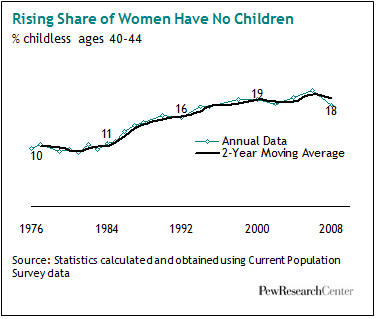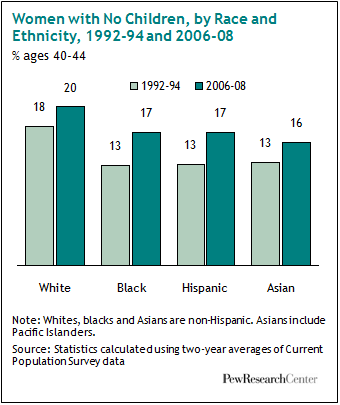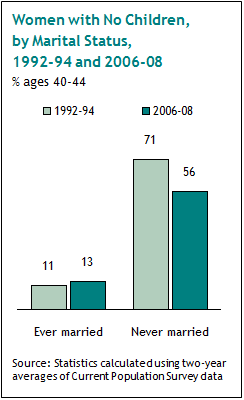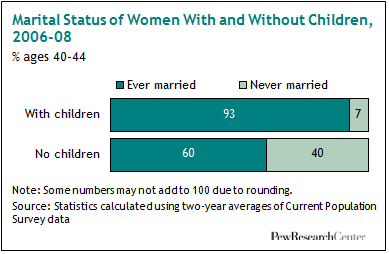Crossposted at Jezebel.
Lisa recently discussed the trend of women having children at older ages. The Pew Research Center also just released data on women who do not have children lessfree (a commenter pointed out that “childless” implies a lack, whereas “childfree” doesn’t; others say “child-free” is also value-laden; “childless” is the word used in the report). They defined “childless” as women aged 40-44 who have no children; importantly, women who have adopted but never given birth themselves are also categorized as without children, which I find rather problematic. I can see why you might want info on both situations, but to define adoptive mothers as not having children? That’s weird. Also, they don’t report info for men.
From the report:
One in five women aged 40 to 44 reported that they’ve never had children. Meanwhile, just 41 percent of Americans say having children is necessary to a good marriage, compared to 65 percent in 1990.
The number has been increasing over time, with slightly short-term dips here and there:
Not having children is more common as education increases, though interestingly, the number of women without kids who have a Master’s or higher degrees is actually lower than in the early ’90s:
Of course, you could interpret the educational pattern a couple of ways. Perhaps achieving advanced degrees requires women who would have liked to have children to choose between career advancement and family life. Or maybe having an advanced degree makes them less attractive to potential partners, or unwilling to accept the partners available to them, so they have to decide whether to be single parents. But of course, it could also be that women who pursue advanced degrees are women who were less interested in having children to begin with. I’m sure there are other explanations and that it’s likely to be a combination of all these factors, and I’m sure somewhere there is data available. Let me know if you’ve got a good link.
But I’m stumped about the decrease in the number of highly-educated women without children between the early ’90s and now. Any thoughts on what might have caused that?
Anyway, moving on…
The increase in women without children holds for all racial/ethnic groups (and, as usual, data on Native Americans wasn’t included; sorry):
Probably not surprisingly, women aged 40-44 who never married are much more likely to be without children than are married women, though as we see, the percentage has gone down, indicating more never-married single mothers:
From that perspective, it appears that marriage and childbearing are tightly linked–only a small proportion of women who have been married at some point have no children.
But if we break down the data a bit, we see that of women aged 40-44 without children, 60% were married at least once:
So while for the U.S. population as a whole, getting married generally indicates children will appear at some point, most women who forgo childbearing do marry at least once, showing that this isn’t just a phenomenon of single women.
Where did I learn about this report? From the website Shit My Kids Ruined, which I read with morbid fascination.






Comments 39
pata — June 26, 2010
There's a big difference between 'childless' and 'childfree'. Childless implies lack or want. Childfree means you chose not to have children and don't feel a loss or want. It's a really big difference. You'd think, a sociology blog... :)
S. Miller — June 26, 2010
But I’m stumped about the decrease in the number of highly-educated women without children between the early ’90s and now. Any thoughts on what might have caused that?
--
Increased employer flexibility maybe? What was going on in the work place in the early 1990s? We have all sorts of technology that lets you work with people without being physically present.
carly — June 26, 2010
I think it could be that ivf and fertility treatments have improved in that time??? (Not that I have any statistics on that, but it would fit in with people having a higher education and a higher income having access to that type of medical assistance.)
Meg — June 26, 2010
What I want to know is, what about the men? It does take two, after all!
Alina — June 26, 2010
"importantly, women who have adopted but never given birth themselves are also categorized as childfree, which I find rather problematic."
Does anyone else feel like this throws the entire study into the crapper? Women who have adopted are not childfree! Women who have adopted are mothers! I'm currently pregnant, and it was a complete accident. Women who adopt are mothers on purpose. How can you possibly exclude them from motherhood by including them in this category?
They have worked hard and jumped through hoops to have children, and to call them childfree is an insult.
Hmph.
mom2gcnj — June 26, 2010
I'm not a sociologist but I am someone who thinks the way we talk about things in important.
So, how exactly is "child-free" any less value laden than "childless"? Childless may imply that the women in question are lacking something that society/biology supposes they should want. Child-free, to me at least, implies that they are free of something onerous - namely the burdens of raising children. Freedom is generally thought of as a positive. Undoubtedly many women in this group do not have positive feelings about being "child-free".
Given the confounding factor that the group in question includes women who are mothering children through adoption, and also presumably women who are mothers by virtue of having given birth but are not raising those children, for whatever reason, wouldn't it be more accurate and less biased to describe the group as "women who have not given live birth"?
Leslee Beldotti — June 26, 2010
1) I am a 44 year old woman.
2) I am married to a man. (This is my 4th hetero marriage.)
3) I am reproductively abstentious.
The world doesn't need more of me in it.
Janey — June 26, 2010
It's possible that it has become safer for older woment to carry pregnancies to term.
Basiorana — June 26, 2010
Slowly but surely, professional jobs are making it easier to have children. Many professional workplaces provide generous maternity leave, work-from-home opportunities, flexible scheduling, health plans with generous maternity coverage, and the ability to pump breastmilk at work. Many women who in the 90s would have looked at their situation and thought, well, probably a bad idea to have kids right now, I'd have to stop working now feel more comfortable balancing a job and kids.
In addition, improved fertility technology means that they are better able to wait to have children, something that highly correlates with higher education. I suspect the stats would be a little less dramatic if they had included adoptive mothers.
linsey — June 28, 2010
Assisted reproductive technology has certainly became more successful between 92/94 and 06/08. TEchnologies for freezing and transferring embryos especially became more successful. I've heard that success rates have doubled - the CDC keeps ART statistics but its tricky to interpret the data. Maybe someone with more time can figure it out. As a midwife, I am seeing more women in their mid-30s who want to get pregnant before they have to use ART. The relative downsides of ART might be pushing women to have babies a little bit earlier (when it would be more successful).
I do think that the change is mostly because more women are getting advanced degrees, and the population of women with a masters is more analogous to the population with a bachelors a decade or two ago.
Waiting Room Reading- 7/1 « Welcome to the Doctor's Office — June 30, 2010
[...] MORE WOMEN NOT HAVING CHILDREN [...]
kishan — July 24, 2010
To,
WEST BENGAL TRANSPORT MINISTER, 23rd; July 2010
KOLKATA
Sub: CITY BUS SERVICES
Dear Sir,
I want to draw your kind attention towards the bus services which is available from 6.00 A.M. to 11.00 in night which seems that your staff must be working in three shifts. Hence, I request you to think on bus services should be 24 hours or from 3.00 A.M. to 1.00 in the night as trains are there from 4.00 A.M. to 12.00 in the night. In the night buses may be less or with a gap of half an hour for public convenience or for needy people.
You may also think for free bus services or four / five poor people may be allowed free of cost in all buses.
I will be very kind of you, we remain
Yours truly,
From
Kishan Jalan
12/2, Shobharam Baisakh Street
Kolkata-700 007
The secretary,
West Bengal Surface Transport Corporation
Calcutta State Transport Corporation
Chief Minister of West Bengal
Public Relations Officer
Sarah — April 8, 2011
Benefits for graduate students and faculty who want to have children have improved DRASTICALLY in the last five to ten years. Right now, none of the full-time female professors in my department have children. However, at the best universities there are currently more policies in place to allow people paid time off to have children, child care credits, or to stop the tenure clock. More women are able to have children and still finish their studies or achieve tenure. That is why more women in academia can have children and manage advanced degrees.
Portal 2 and Feminism « Bakka's River — May 5, 2011
[...] life characteristic of men. For example, women who succeed in academics and other professions tend to have fewer children. One of the big features of the gender-wage-gap can be attributed to whether someone is a mother. [...]